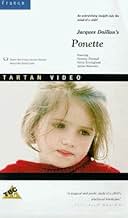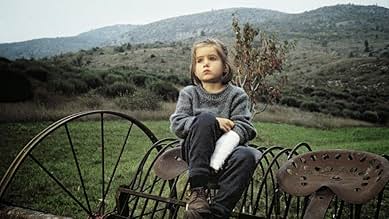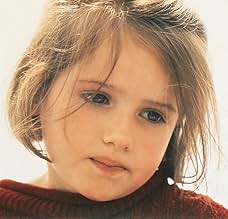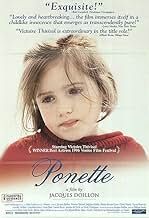IMDb RATING
7.5/10
4.9K
YOUR RATING
A four-year-old girl tries to come to terms with the sudden death of her mother.A four-year-old girl tries to come to terms with the sudden death of her mother.A four-year-old girl tries to come to terms with the sudden death of her mother.
- Director
- Writers
- Stars
- Awards
- 11 wins & 6 nominations total
Benjamin Charles
- Anthony
- (as Benjamin Lemaire)
Luna Ragheb
- Ponette
- (voice)
- Director
- Writers
- All cast & crew
- Production, box office & more at IMDbPro
Featured reviews
This 1996 French film is reminiscent of an earlier French film from the 60s; Serge Bourguignon's "Sundays and Cybele", which also featured an astounding performance by a young girl, the remarkable Patricia Gozzi (Rapture '65)
Director/Writer Jacques Doillon has achieved the almost impossible with this production, in fact it would seem as if the story was built around the talents of its remarkable young child star; four year old Victoire Thivisol. Very few four year olds could manage the intense work required to bring this story to life. The Director (and or Producer) has wisely gathered a crew of highly specialized technical professionals, who create the incredible illusion the viewer is following the lives of the characters as they unfold.
Cinematographer: Caroline Champetier is known for her vivid Documentaries and features (Of Gods and Men '10 ~ Last Days in Jerusalem '11 ~ The Bear '88) Then, to piece the images together seamlessly, they chose Editor/Director: Jacquelne (Fano) Lecompte, known for her collaborations with documentary director Francois Bel. Both Bel and Lecompte won awards for their "Territory of Others" in 1970. When you also add to the above, Camera Operator/Director of Photography: Julien Hirsch (Korkoro '09) they made for a very solid collaborative team - all documentary trained filmmakers of renown.
Some reviewers have quite reasonably drawn attention to the use of such a young cast for a highly emotional subject...dealing with the death of a beloved parent (in this case the girls own mother) This child has numerous harrowing scenes, including clawing at the earth of her mother's grave begging for her to "come back"! The method chosen for ending the film is good, but a little jarring...with the appearance of the girls mother! This could be taken as a child's imaginings, but these scenes are filled with very 'real' details - leaving the viewer unsure. Ponette's mother is played by Marie Trintignant, who just a few years later would sadly go to her own grave at only 41. With so many tears of tragedy needed throughout the entire story, it makes one wonder about the methods of prompting required to elicit so much from a four year old?
The film makers and distributors must also have been concerned, as the video cover features an entire two page disclaimer - regarding managing the effects on the child star --written by a Psychologist--. Makes you wonder. Composer Philippe Sarde (Tess '79 ~ The Bear '88 ~ The Tenant '76) has written a sensitively expressive music score that's never intrusive. The adult characters in the early stages of the film can seem a little sketchy, with Ponette's father abandoning his grieving daughter by going away for an unexplained reason, leaving her in boarding school or with various relatives. Some of the scenes with her Auntie (and cousin's) do manage to achieve a level of interest and thoughtfulness.
A beautiful film for those who like a special kind of story telling or love children. The Tartan VHS release is OK, but appears to be a rare find on DVD.
Director/Writer Jacques Doillon has achieved the almost impossible with this production, in fact it would seem as if the story was built around the talents of its remarkable young child star; four year old Victoire Thivisol. Very few four year olds could manage the intense work required to bring this story to life. The Director (and or Producer) has wisely gathered a crew of highly specialized technical professionals, who create the incredible illusion the viewer is following the lives of the characters as they unfold.
Cinematographer: Caroline Champetier is known for her vivid Documentaries and features (Of Gods and Men '10 ~ Last Days in Jerusalem '11 ~ The Bear '88) Then, to piece the images together seamlessly, they chose Editor/Director: Jacquelne (Fano) Lecompte, known for her collaborations with documentary director Francois Bel. Both Bel and Lecompte won awards for their "Territory of Others" in 1970. When you also add to the above, Camera Operator/Director of Photography: Julien Hirsch (Korkoro '09) they made for a very solid collaborative team - all documentary trained filmmakers of renown.
Some reviewers have quite reasonably drawn attention to the use of such a young cast for a highly emotional subject...dealing with the death of a beloved parent (in this case the girls own mother) This child has numerous harrowing scenes, including clawing at the earth of her mother's grave begging for her to "come back"! The method chosen for ending the film is good, but a little jarring...with the appearance of the girls mother! This could be taken as a child's imaginings, but these scenes are filled with very 'real' details - leaving the viewer unsure. Ponette's mother is played by Marie Trintignant, who just a few years later would sadly go to her own grave at only 41. With so many tears of tragedy needed throughout the entire story, it makes one wonder about the methods of prompting required to elicit so much from a four year old?
The film makers and distributors must also have been concerned, as the video cover features an entire two page disclaimer - regarding managing the effects on the child star --written by a Psychologist--. Makes you wonder. Composer Philippe Sarde (Tess '79 ~ The Bear '88 ~ The Tenant '76) has written a sensitively expressive music score that's never intrusive. The adult characters in the early stages of the film can seem a little sketchy, with Ponette's father abandoning his grieving daughter by going away for an unexplained reason, leaving her in boarding school or with various relatives. Some of the scenes with her Auntie (and cousin's) do manage to achieve a level of interest and thoughtfulness.
A beautiful film for those who like a special kind of story telling or love children. The Tartan VHS release is OK, but appears to be a rare find on DVD.
10pjl-7
Nobody watching this film can failed to be touched, moved, transported and transformed by it. Others here have already expressed the enormous power of the movie, and particularly of its star, Victoire Thivisol. If you're reading this to see if you should watch it, I'd say, drop everything and go buy it so you can watch it over and over. But buy a case of Kleenex (TM) too, you're going to need them!
As I watched the movie, I had the impression that director Jacques Doillon had simply found a real-life tragedy and somehow followed the participants through it with his camera. Nothing in this film gives you the impression of having been written, scripted, staged, produced. It is all so completely natural that you experience first hand the pain, the emotional agony of Ponette, as if she were your own daughter, your own sister, even your own self.
As I watched the movie, I had the impression that director Jacques Doillon had simply found a real-life tragedy and somehow followed the participants through it with his camera. Nothing in this film gives you the impression of having been written, scripted, staged, produced. It is all so completely natural that you experience first hand the pain, the emotional agony of Ponette, as if she were your own daughter, your own sister, even your own self.
A 4-year-old French girl, Ponette (Victoire Thivisol) waits for the return of her mother, who has just died at an auto accident.
This beautiful and sensitive drama surprised a lot of people when won the Volpi Cup for Best Actress at the Venice Film Festival 1996, given to a 5-year-old novice, Victoire Thivisol. She is really magnificent and, controversy aside, the important award recognized the biggest achievement in the film: Victoire reacts with amazing naturalness and outstanding facial expressions to the most intricate scenes. "Ponette" is a film that certainly will be in your memory, mostly because of a too young girl who shows the difference between a little great actress and a gracious child who wrinkles the eyebrows eloquently.
This beautiful and sensitive drama surprised a lot of people when won the Volpi Cup for Best Actress at the Venice Film Festival 1996, given to a 5-year-old novice, Victoire Thivisol. She is really magnificent and, controversy aside, the important award recognized the biggest achievement in the film: Victoire reacts with amazing naturalness and outstanding facial expressions to the most intricate scenes. "Ponette" is a film that certainly will be in your memory, mostly because of a too young girl who shows the difference between a little great actress and a gracious child who wrinkles the eyebrows eloquently.
I love everything about this film. The cast portrayed their characters well; the script presented a variety of philosophical viewpoints; and many of the interactions between the children were symbolic of religion in the adult world. Those who would be thrown off by this sort of a thing should not worry, because there are plenty of sweet moments and a very satisfying ending. And I must say that that little girl's performance was utterly stunning. Amazingly enough, she was four years old during filming. I would recommend it to anyone with a brain or a heart.
I have wanted to see this movie for a very long time. At the time it was released, my own Mother had suddenly died and I knew that it would have been too intense for me to watch. Now, it is almost 11 years later and I have finally watched it and this is quite simply one of the most true to life portrayals of grief and the journey it becomes for really anyone. I was Ponettes age when my father died and I can completely relate to her reactions, her agony and the confusion she portrayed. I can remember asking constantly when Daddy was coming back and not really accepting the answers that people were telling me. I also recall praying and talking to my father when I was alone in my room, begging him to come back and see me when no one else was around. I even had a dream about my father that was amazingly close to Ponettes interaction with her mother. This rang so true for me that I couldn't believe the writer of this story connected things in such a realistic way. Victoire Thivisol is shockingly real in this role. I cannot believe she was only 4 years old when this was filmed! It's a fascinating study of a shields emotional response to such a tragic event and quite honestly, I am at a total loss of words as to how to describe the power of this movie. I can only tell you that if you are looking for something intense and engrossing, this would be your movie. I really appreciated the feeling it left me with at the end too.....that life is not always easy and predictable but that humans are remarkably resilient beings who can actually grow in wonderful ways from the events that challenge us the most.
Did you know
- TriviaThe magic spell the kids say, "Ta'ali Takum", is actually the "Talitha koum" of Jesus. In Mark 5:41, Jesus says the phrase "Talitha koum" (Aramaic for "Little girl, get up") to a dead girl, when he resurrects her.
- GoofsIn the cemetery scene, Ponette is shown piling dirt onto her legs as she kneels beside the grave. In the next shot, her legs have no dirt and her pants are clean.
- Quotes
La Fille de l'Internet: You shouldn't be so sad.
Ponette: Yes, I should.
La Fille de l'Internet: Your mother was sad, too. She cried on her way to Heaven. God cried as He waited for her. When God was on earth as Jesus, He cried, too. But usually He was as joyful as a child.
Ponette: It isn't joyful to be a child.
- How long is Ponette?Powered by Alexa
Details
Box office
- Gross US & Canada
- $1,300,377
- Gross worldwide
- $1,300,377
- Runtime
- 1h 37m(97 min)
- Color
- Sound mix
- Aspect ratio
- 1.66 : 1
Contribute to this page
Suggest an edit or add missing content


























